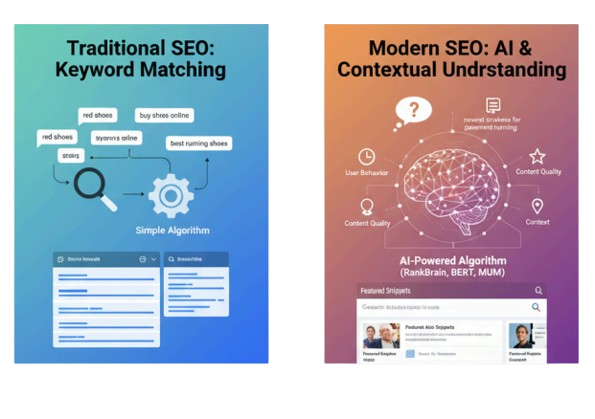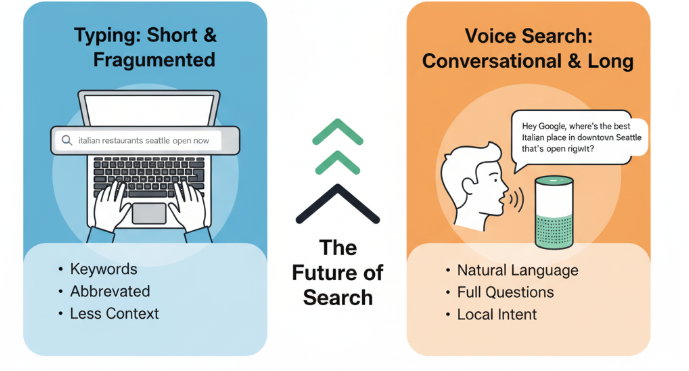Future-Proof Your SEO: The Impact of AI and Voice Search on Your Ranking

SEO is evolving fast. If you’re still depending on keyword stuffing and basic link building, you’re not just behind—you’re risking your search visibility. With AI and voice search changing how search engines interpret content and how users search, adapting to these new shifts is essential to future-proof your SEO.
The AI Revolution in Search: Beyond Keywords
Google's algorithms, powered by sophisticated AI, are no longer simple keyword matching machines. Tools like RankBrain, BERT (Bidirectional Encoder Representations from Transformers), and the more recent MUM (Multitask Unified Model) allow search engines to:
- Understand Context and Intent: AI helps Google decipher the true meaning behind a search query, even if the exact keywords aren’t present. It understands nuances, synonyms, and the user’s underlying intent, not just the literal words.
- Process Natural Language: This means queries can be more conversational and complex.
- Evaluate Content Quality Holistically: AI assesses content for comprehensiveness, authority, user engagement, and relevance, moving far beyond superficial SEO tactics.
What This Means for Your SEO:
The benefits of hyper-personalization are undeniable:
- Focus on Topical Authority: Instead of optimizing for individual keywords, create comprehensive content that covers a topic in depth. Become the definitive resource.
- Write for Humans First: Natural language, clear explanations, and readability are paramount. AI rewards content that genuinely serves user needs.
The Rise of Voice Search: Speaking Your Way to the Top
"Hey Google, what's the weather like?" "Alexa, order more coffee." "Siri, find a pizza place near me." Voice search isn't just a novelty; it's a rapidly growing method of interaction, especially with the proliferation of smart speakers and mobile assistants.

Key Characteristics of Voice Search:
- Conversational and Long-Tail: People speak differently than they type. Voice queries are typically longer, more conversational, and often posed as full questions. (e.g., “best Italian restaurant in downtown Seattle open now” vs. “Italian restaurant Seattle”).
- Direct Answers: Voice assistants aim to provide a single, definitive answer, often pulling from featured snippets.
What This Means for Your SEO:
- Optimize for Long-Tail Keywords & Questions: Think about the exact questions your audience might ask a voice assistant. Use tools to find common questions related to your niche.
- Structured Data (Schema Markup): This is crucial. Schema markup helps search engines understand the context of your content, making it easier for AI to pull it as a direct answer.
- Local SEO is More Important Than Ever: Ensure your Google My Business profile is optimized, accurate, and regularly updated.
- Fast Loading Times & Mobile-Friendliness: Voice search is predominantly mobile. Your site must be fast and responsive.
Actionable Strategies to Future-Proof Your SEO
- Content Excellence is King: Create high-quality, in-depth, well-researched content that genuinely answers user questions and provides value. Think “pillar pages” and topic clusters.
- Embrace Conversational Language: Write naturally. Incorporate FAQs into your content, using the exact questions users might ask.
- Implement Schema Markup: Use relevant schema types (e.g., FAQPage, HowTo, LocalBusiness) to give search engines explicit clues about your content.
- Prioritize Local SEO: Optimize your Google My Business profile, get local citations, and encourage reviews.
- Focus on User Experience (UX): A fast, mobile-friendly, easy-to-navigate website with a clear site structure signals quality to AI.
- Monitor & Adapt: SEO is never “set it and forget it.” Keep an eye on algorithm updates, industry trends, and user behavior changes.
Final Thoughts
AI and voice search aren’t “coming soon” — they’re already reshaping how people discover brands online.
In a world where users expect fast, natural, and hyper-relevant answers, SEO that relies only on keywords and backlinks will quietly disappear from the results page.
But businesses that embrace intent-focused content, conversational optimization, structured data, and stellar user experience will not only protect their rankings — they’ll build trust, win more voice answers, and stay visible in an AI-driven future.
Author: Mohammed Uzaif
Digital Marketing Strategist In Ksaragod | Exploring the Future of Personalized Experiences